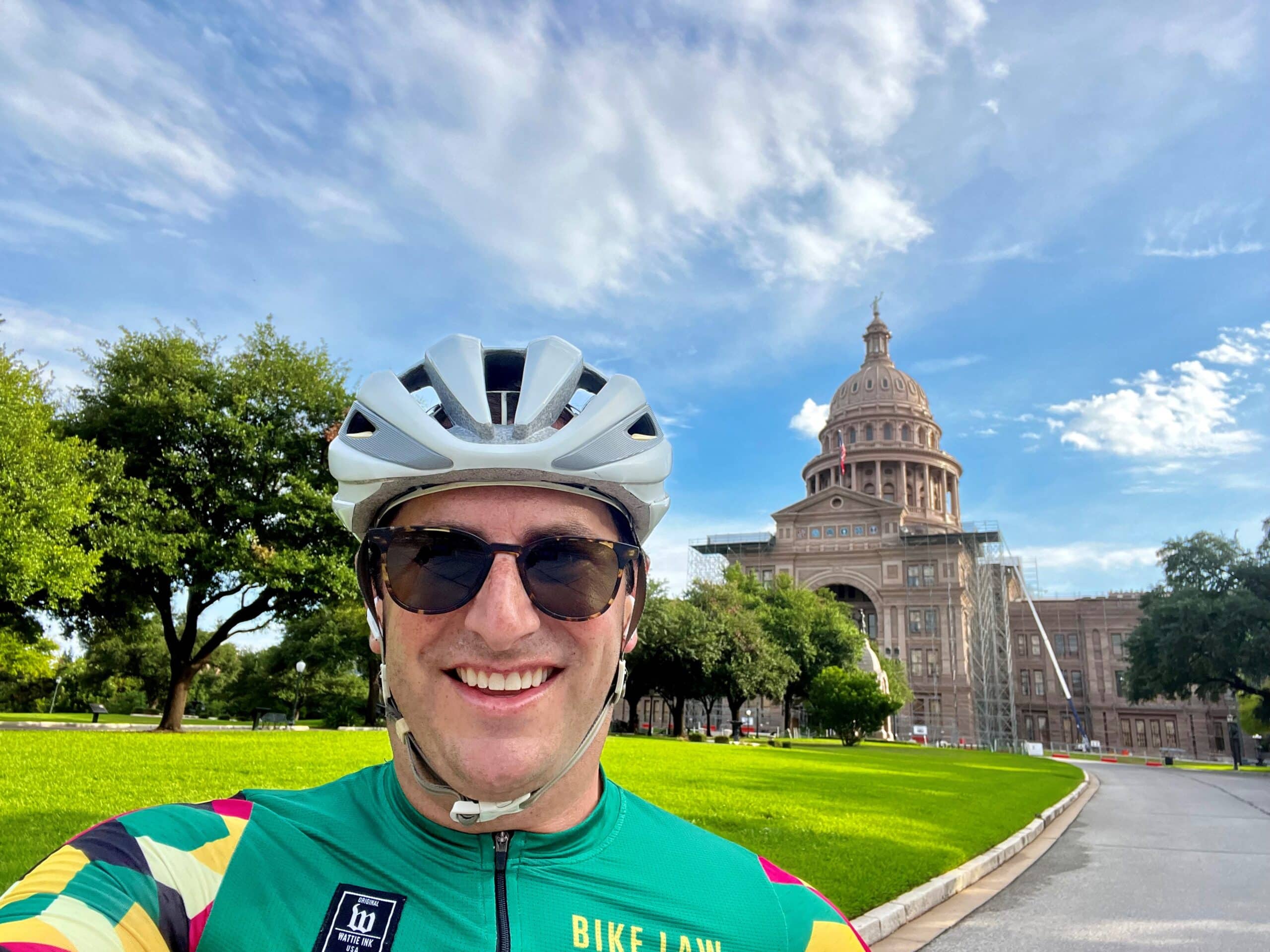The raw number of bicycling deaths that have occurred in Michigan over the last few years has clearly got the attention of people across the country. However, the individual cases associated with these fatal collisions are closely followed by local cyclists and, almost always, the results only cause frustration and anger. At the conclusion of these criminal proceedings, the comments on social media blame police, prosecutors, judges, jurors, and others. In my opinion, it is the time we stopped looking to blame others for this lack of accountability and look for solutions. To do so, it is first important to understand how the system works, and then, ask what changes can and should be made to make our system more fair and just.
Criminal vs Civil Bicycle Law Cases
Members of the Bike Law Network typically represent bicyclists in civil claims, which are known as civil litigation. Unless a client is wrongfully ticketed while riding a bicycle, we are rarely involved in a criminal case. To our frustration, those that injure or kill our clients are rarely charged with a crime. When negligent, careless, or even reckless drivers are charged, the charges are almost always disappointingly “soft” from the bicycling community’s perspective. However, the decision to charge (or not charge) a motorist with a crime is not our decision, it is not one that can be made by our clients, or their families. Instead, it is exclusively a decision made by local prosecutors. For this reason, as lawyers representing injured bicyclists, we pay attention to what happens in criminal proceedings, and may even confer with prosecutors. However, we rarely get involved and rarely expect much to come from the criminal justice system to make bicyclists, or their families, feel like the system is there to protect them.
The Criminal Case Following the Death of Karen McKeachie
A few weeks ago, on April 13, 2017, I badly wanted to see things differently. This date fell right in the middle of “National Crime Victims’ Rights Week.” The slogan for this national recognition of the victims of crime was, “Serving Victims, Building Trust, Restoring Hope.” This date was also the day set for the sentencing of Terry Lee LaCroix, the man who killed my client, Karen McKeachie, an enormously popular woman, wife, and world champion triathlete. In Karen’s case, the defendant, Terry Lee LaCroix passed another car traveling westbound on Dexter-Chelsea Road, and crossed the centerline of Dexter-Chelsea Road, while Karen and two friends were riding their bicycles eastbound on the same road. Two of the bicyclists turned into the ditch on the side of the road and were able to avoid LaCroix’s truck. Tragically, Karen wasn’t able to do the same, and she was struck by the front left portion of the truck, while in the eastbound lane. Witnesses have confirmed LaCroix started to leave the scene, but he eventually stopped and returned, only to make comments suggesting that the bicyclists were somehow in “his passing lane.” With the exception of cases involving drugs, alcohol, or texting, LaCroix’s conduct is, in our opinion, one of the most egregious we have seen.
The Washtenaw County Prosecutor chose to charge LaCroix with the crime of “Moving Violation Causing Death,” which is a misdemeanor. Outraged by the fact that LaCroix was only charged with a misdemeanor, and concerned the judge would not sentence LaCroix to any jail time, approximately 170 people on bicycles rode to the Chelsea District Court for LaCroix’s sentencing. Many of Karen’s friends, family members, training partners, and others showed their support for Karen’s family by also attending the sentencing. Additionally, many wrote letters to the Court, asking that LaCroix receives a harsh sentence and Karen’s family members made compelling statements explaining why jail time was appropriate for such a reckless disregard for human life. The only one who spoke on LaCroix’s behalf was his attorney, who further angered cyclists when he chose to blame the victim and the other cyclists, stating, “It was a recipe for disaster,” since the cyclists were riding their bikes on a “rural road with no bike lane.” In the end, LaCroix’s sentence included no jail time. He was simply given probation and required to pay a fine of court costs of $3,000. The Michigan bicycle community was and still is, understandably outraged. The organizer of the ride to the courthouse, Jason Aric Jones, told local media outlets, “If you ever want to murder someone, the best way to do it is to get them on a bike and run them down and say it’s an accident, and you’ll get off paying $3,000.”
Why Motorists are Only Charged with Minor Crimes after Killing a Cyclist
Like many Michigan bicyclists, I am outraged when I see motorists that kill bicyclists charged with only minor crimes. However, the prosecutor often has little or no choice but to charge the defendant with a misdemeanor.
In most of the cases I have seen involving the death of a bicyclist, the motorist strikes the cyclist from behind and claims they didn’t see the cyclist (usually claiming that the sun was in their eyes). The most common charge in these cases is the same crime LaCroix was charged with violating, “Moving Violation Causing Death.” As noted above, this is a misdemeanor charge, which understandably angers most people who ride a bike. Many in the bicycle community would like to see motorists that kill cyclists charged with “vehicular homicide.” However, simply stated, Michigan doesn’t have a crime called “vehicular homicide.” A similar crime used to exist, called “negligent homicide.” The crime (MCL 750.324) was defined as:
Any person who, by the operation of any vehicle upon any highway or upon any other property, public or private, at an immoderate rate of speed or in a careless, reckless or negligent manner, but not wilfully or wantonly, shall cause the death of another, shall be guilty of a misdemeanor, punishable by imprisonment in the state prison not more than 2 years or by a fine of not more than $2,000.00, or by both such fine and imprisonment.
However, in 2009 (effective October 31, 2010), the Michigan Legislature repealed the statute and replaced it two new statutes: (1) reckless driving causing death [MCL 257.626(4)], and (2) moving violation causing death [MCL 257.601d]
- Reckless Driving Causing Death is a felony punishable by not more than 15 years or a fine of $2,500 – $10,000, or both. It requires the prosecutor to prove that the defendant was intentionally driving with willful and wanton disregard for the safety of others.
- Moving Violation Causing Death is a misdemeanor punishable by imprisonment for not more than one year or a fine of not more than $2,000.00, or both.
It is also important to understand that when the Legislature passed these laws, it included a requirement that when there is a prosecution for reckless driving causing death, the jury shall not be instructed regarding the crime of moving violation causing death (as a lesser included offense /charge). The Michigan Court of Appeals ruled this bar on a lesser included offense was unconstitutional. However, the finding was overruled by the Michigan Supreme Court in December 2015. As a result, a prosecutor now must choose between charging a defendant with reckless driving causing death (a felony with a more significant sentence, but is harder to prove) OR moving violation causing death (a misdemeanour that carries a less severe sentence but is easier to prove).
The Case of People v Terry Lee LaCroix
To understand the difficult decision a prosecutor must make, let’s take a look at the case of People v Terry Lee LaCroix. A prosecutor looking at the case could be confident he/she would succeed on a charge of Moving Violation Causing Death. There is no question LaCroix was clearly negligent and that he clearly violated the Michigan Vehicle Code (which requires all motorists to remain in their lane of travel, until they first determine that they can safely pass). However, could the prosecutor be just as confident with a charge of Reckless Driving Causing Death?
As noted above, to prevail, the prosecutor would have to prove LaCroix drove with willful and wanton disregard for the safety of others. (1) Willfully means that the defendant knowingly created the danger and intended to cause injury. (2) Wantonly means that the defendant knowingly created the danger and knew what would probably happen when [he/she] did it.
I am very familiar with the facts of this case and believe it is no different than many situations I have encountered as a bicyclist. A motorist is in a hurry and they feel the need to save a few seconds by passing another car on a two-lane road. They see bicyclists coming in the other direction, but figure a bicycle doesn’t have the same rights to use the road as a car or truck, and they know they won’t be harmed by a bicycle. They also know the bicyclist, will likely pull off the road (and this is usually a fair assumption, I know I have done it more times than I can recall). They are clearly self-absorbed, narcissistic individuals who may intend all types of awful things, but can the prosecutor prove that they intended to cause an injury (rather than simply scare the cyclists)? This is obviously a much more difficult task, and since the prosecutor can’t include the lesser charge of Moving Violation Causing Death, if the prosecutor attempts to obtain a conviction for Reckless Driving Causing Death, and fails, the defendant walks away without any criminal finding of culpability. Simply stated, given the current state of Michigan law, when a motorist injures or kills a bicyclist, the prosecutor is left with an almost impossible decision regarding the appropriate charge for the crime and it is damn near impossible to obtain a meaningful conviction.
VRU Laws = Accountability for Drivers that Kill Cyclists
“Damn near impossible” shouldn’t be the standard we require to convict a driver who chooses to drive in such a reckless manner when they kill a mother, father, sister, brother, or friend who is doing nothing more than lawfully riding a bike. Our criminal justice system includes laws to protect some of the most vulnerable roadway users from careless and reckless drivers. Michigan currently has laws that provide enhanced penalties for drivers that injure or kill police officers, road construction/maintenance workers, and those operating an implement of husbandry. The League of Michigan Bicyclists (LMB) has drafted proposed legislation that would provide cyclists, pedestrians, and wheelchair users with this same protection. The proposed laws are typically referred to as Vulnerable Roadway User (VRU) Laws and would provide law enforcement and prosecutors with an enhanced set of tools to bridge the gap between basic traffic infractions and more serious crimes. This legislation was introduced in the Michigan House of Representatives in 2013 but never made it out of committee. The LMB is currently looking for State Senators and Representatives who are willing to sponsor VRU legislation, this legislative session.
Stand Up for VRU Laws and Other Legislation to Protect Michigan Cyclists
The League of Michigan Bicyclists works all year to advance a legislative agenda for bicyclists. You can be part of that effort by attending Lucinda Means Bicycle Advocacy Day, on May 24, 2017. At this event, the LMB’s legislative priorities will likely be seeking support for legislation requiring drivers’ education classes to include class time on awareness and the rights of bicycles to use Michigan roads and a safe passing distance of 5 feet between cars and bicycles. Please join the bicycling community in its efforts to advance these laws and make Michigan roads safer for all of us, by registering for Bicycle Safety Day.








